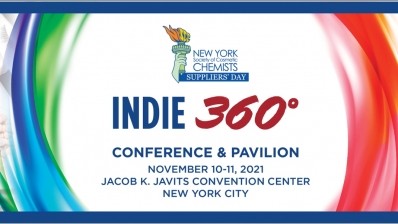Bio-based solvent offers petro-free option for fragrance, can cut up to 50% of GHG emissions

The San Diego based company showcased their Brontide natural butylene glycol in the show’s fragrance pathway as the company attempts to transition the ingredient from primarily personal care products into the world of perfumes and other scents.
Genomatica Product Marketing Manager Kyle Huston said the company develops ingredients through biofermentation of sugars and created the Brontide natural butylene glycol as an alternative solvent to the conventional petroleum-based butylene glycol.
Moving into fragrance
The ingredient has been on the market for around three years as a personal care solvent and Huston said the company recently began building out data to show its use in the fragrance sector.
“We went, used a master perfumer to develop a data set to understand how it compared to other common solvents and found that not only does it work as a great solvent, but it generates a clearer and more affective reveal of these fragrance molecules than even the industry benchmarks of dipropylene glycol,” Huston said.
While the bio-based solvent performed well overall, he also said the data gave Genomatica insight as to when the ingredient works well and when it does not. For instance, it did not hold up as well with oily or citrus-heavy formulas.
Brontide® natural butylene glycol is a new, sustainable natural diluent that improves fragrance performance. View the recent study that reveals how Brontide® can increase the value and performance of a fragrance. https://t.co/0Nq35LrPde Request a sample: https://t.co/QokDAEb3cDpic.twitter.com/EVjBU7yRO7
— Brontide® natural butylene glycol (@Brontidebg) September 14, 2021
Huston said the company wants to provide as much information as possible so when chemists sit down at the bench to formulate the ingredient performs as advertised. With the data currently available, they can determine which fragrances can use their solvent exclusively and which ones can use a mix of bio and petroleum-based solvents.
The Brontide also was very stable in testing, as long as the ingredient was stored correctly, like any other humectant.
Genomatica is hoping to increase awareness of their ingredient among the fragrance sector but is also looking to do more research into specific types of fragrances from personal care and candles to scents for pesticides.
Sustainability claims
While replacement of a petroleum-based solvent which makes up a large portion of fragrances inherently has viable sustainability claims, Huston said Genomatica has compiled a full lifecycle analysis based on ISO sustainability guidelines.
“The upshot of that is that the carbon footprint of Brontide natural butylene glycol is half that of the petrochemical alternative,” he said. “What that means for our customers is that if they were buying the petrochemical butylene glycol and they wanted to shift it to Brontide nature butylene glycol, for that portion they get to cut their emissions in half.”
In 2020 Genomatica’s ingredient was actually recognized by the Environmental Protection Agency’s Greener Synthetic Pathways Award for replacing a petrochemical-based solvent with a natural alternative which only takes one step to produce, which “reduces greenhouse gas emissions and avoids the use of hazardous chemicals in the production process.”
Perhaps more importantly than the sustainability alone, Huston said Brontide performs and behaves in the same way as its petrochemical counterpart, so formulators don’t have to reformulate existing products or reeducate themselves on using a solvent.
In the past, the natural version of products across industries, from chemicals to shoes to cars, have performed more poorly than synthetics or were more expensive, Huston said. But with their Brontide ingredient, perfumers have responded well because they wouldn’t have to make large sacrifices to transition to a bio-based ingredient.
“Now we can get to a place where if you can say cost is similar and performance is just as good or better, then people will buy it,” he said. “That’s the same for anything, not just chemistry. We’re to that place where the economics make sense, and the performance is as good or better than the alternative.”

![An international fragrance competition will introduce a new source of Indian sandalwood to perfumers, after decades of the ingredient being essentially out of reach [Getty Images]](/var/wrbm_gb_food_pharma/storage/images/_aliases/wrbm_medium/publications/cosmetics/cosmeticsdesign.com/article/2021/11/10/quintis-american-society-of-perfumers-competition-to-bring-indian-sandalwood-back-to-market/12990359-4-eng-GB/Quintis-American-Society-of-Perfumers-competition-to-bring-Indian-sandalwood-back-to-market.jpg)








